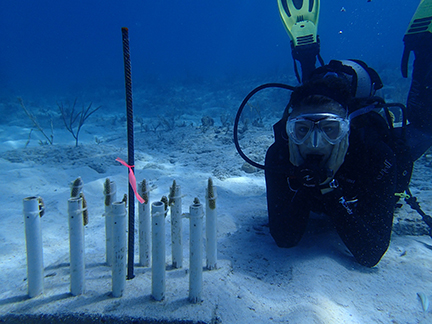Even though they occupy less than one percent of the Earth surface, coral reefs are the ocean’s most diverse ecosystems, supporting 25 percent of all marine life, as well as a source of food, medicinal compounds, tourism and physical barrier to hurricanes.
Maite Nunes Ghazaleh, a second-year doctoral student in environmental health science at the College of Public Health, was awarded a National Science Foundation Graduate Research Fellowship to fund her research on coral health. These highly competitive awards recognize and support outstanding graduate students in science, technology, engineering and mathematics disciplines.
“The future for our coral reefs is looking pretty dim as of right now, especially when we consider how the progressing El Niño and warming ocean temperatures have contributed to bleaching most of our coral,” said Ghazaleh. “What we scientists need to do is understand the factors that play into coral disease, especially at a time when they are so vulnerable.”
Corals are hosts to several species of microbial organisms that interact with the coral, she explained. These microbial organisms, which include bacteria, viruses and zooxanthellae, collectively form the coral microbiome.
“Corals are foundation species, meaning that they create complex habitats in which other marine organisms survive. A healthy coral reef can sustain an entire marine ecosystem including a plethora of invertebrates and multiple species of fish,” said Ghazaleh.
“My research aims to understand the mechanisms that drive coral disease. Specifically, I am studying the influence of environmental stress on the coral microbiome, or the microbial community that is associated with the coral, and how this then relates to disease development.”
A recent study from researchers at UGA in the Dept. of Environmental Health Science found that iron-rich pulses of dust from the Saharan desert lead to large blooms of potentially pathogenic Vibrio bacteria in the marine surface waters of the Caribbean. Vibrio bacteria are implicated in both human and coral infections. Ghazaleh’s research will examine how this phenomenon might impact the coral microbiome and ultimately the health of coral reefs. A healthy coral reef could mean better and safer water quality for both tourists and locals.
“There are several diseases that affect corals. Disease signs include black bands, white patches, yellow bands and other discolored spots on the coral tissue. Unfortunately, the pathology of many coral diseases is not well known,” said Ghazaleh.
Through her research, she hopes to help describe the mechanisms behind coral disease, such as the conditions that make coral more susceptible to illness, and the role that coral-associated microbes have in disease development.
Ghazaleh, who is also a UGA Graduate School Presidential Fellow, was one of 2,000 fellows selected nationwide from nearly 17,000 applicants for the 2016 competition. Fellows benefit from a three-year annual stipend of $34,000 along with a $12,000 cost of education allowance for tuition and fees, and opportunities for international research and professional development.
Ghazaleh received a B.S. in environmental science with minors in biology and marine science from the University of North Carolina at Chapel Hill. As an undergraduate, she participated in research at the UNC Institute of Marine Science, Duke University Marine Lab, and the NOAA Southeast Fisheries Science Center as a NOAA Ernest F. Hollings Undergraduate Scholar. In 2015, she began her doctoral studies at the UGA under the mentorship of Dr. Erin Lipp, professor of environmental health science.
In addition to a strong research plan and experience, NSF fellowship recipients were selected for their engagement in activities that benefit those outside the academic science community and contribute to the advancement of scientific knowledge and literacy.
Ghazaleh’s passion for STEM education inspired her to bring a chapter of the Scientific Research & Education Network (SciREN) to the University of Georgia with the help of Courtney Thomas, a master’s student in the Department of Marine Science in Franklin College of Arts and Sciences, and Ruth Wangia, a doctoral student in the Environmental Health Science Department. SciREN is a graduate student led group connecting scientists and K-12 educators through lesson planning workshops and networking events.
“I believe one of the best ways that graduate students can make a difference in this world is by sharing their knowledge,” she said.
“With SciREN, researchers join efforts with local teachers to expose elementary, middle and high school students to cutting-edge research. SciREN serves to both increase public scientific literacy and inspire young people to care about our world.”
Posted July 22, 2016.







